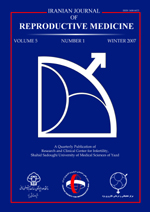
|
International Journal of Reproductive BioMedicine
Research and Clinical Center for Infertility, Shahid Sadoughi University of Medical Sciences of Yazd
ISSN: 1680-6433
EISSN: 1680-6433
Vol. 16, No. 8, 2018, pp. 529-534
|
 Bioline Code: rm18063
Bioline Code: rm18063
Full paper language: English
Document type: Short Communication
Document available free of charge
|
|
|
International Journal of Reproductive BioMedicine, Vol. 16, No. 8, 2018, pp. 529-534
| en |
Influence of body mass index and polycystic ovarian syndrome on ICSI/IVF treatment outcomes: A study conducted in Pakistani women
Rehman, Rehana; Mehmood, Mohsin; Ali, Rabiya; Shaharyar, Saeeda & Alam, Faiza
Abstract
Background: Obesity may establish a crucial barrier for effective fertility treatment
in polycystic ovary syndrome (PCOS) females.
Objective: To compare results of intra-cytoplasmic sperm injection (ICSI) in
females with and without polycystic ovarian syndrome and further appraise the
effect of obesity in PCOS females.
Materials and Methods: A cross-sectional study from June 2015 to July 2016
included non-PCOS and PCOS (recognized by Rotterdam criteria) females who
underwent ICSI. The PCOS were further stratified into non-obese and Obese
according to the South Asian criteria for body mass index. Results were categorized
on the basis of beta-human chorionic gonadotropin (β-hCG) and transvaginal scan
into non-pregnant (β-hCG <25 mIU/ml), preclinical abortion (β-hCG >25 mIU/ml
with no fetal cardiac activity) and clinical pregnancy (β-hCG >25 mIU/ml with fetal
cardiac activity on transvaginal scan). In addition, reproductive outcomes;
implantation rate, clinical pregnancy rate and miscarriage rate among obese and
non-obese PCOS and non-PCOS patients were compared.
Results: Our results revealed 38.5% clinical pregnancy rate in non-PCOs females,
23.8% in non-obese PCOS females whereas 26.4% in obese PCOS. Preclinical
abortions were found to be highest (31.5%) in non-obese PCOS females and were
the lowest (26.2%) in non-PCOS females. In non-PCOS group and non-obese PCOS
females 35.4% and 44.6%, respectively, failed to become pregnant.
Conclusion: The success after ICSI in terms of number of clinical pregnancies was
more in non-PCOS patients as compared to PCOS. Increase in body mass index
reflected a negative impact on the reproductive outcome in PCOS patients.
Keywords
Quetelet’s index; Obesity; Polycystic ovary syndrome; Sperm injection; Intracytoplasmic; Infertility.
|
| |
© Copyright 2018 - International Journal of Reproductive BioMedicine
Alternative site location: http://www.ijrm.ir
|
|
